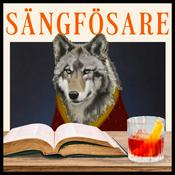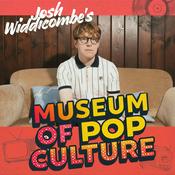17 avsnitt
- This week, we’re talking Giulia Tofana and the infamous Aqua Tofana — the legendary 17th-century poison rumored to be colorless, tasteless, and almost impossible to detect. We break down the history, the myths, and why this story still fascinates people today, especially its ties to women secretly poisoning abusive husbands in a time when divorce wasn’t an option.
Plus, because it’s us, we’re playing Fuck, Marry, Kill inspired by the episode.
If you love dark history, true crime legends, and chaotic commentary, this one’s for you.
SOURCES:
Griffiths, Arthur. “Female Criminals.” The North American Review 161, no. 465 (1895): 141–52. http://www.jstor.org/stable/25103561.
Review of Inorganic Poisons, by Paul Dittrich, Franz Erben, and R. v. Jaksch. The British Medical Journal 2, no. 2556 (1909): 1802–3. http://www.jstor.org/stable/25289004.
Johann Wilhelm Archenholz recounted the story of “Aqua Tofana” in his travel narrative England und Italien (1785)
https://www.folger.edu/blogs/shakespeare-and-beyond/women-and-early-modern-poison/
Dash, Mike. “Aqua Tofana,” n.d.
From the greater book “Toxicology in the Middle Ages and Renaissance”
Ferraro, Joanne M. “The Power to Decide: Battered Wives in Early Modern Venice.”
Renaissance Quarterly 48, no. 3 (1995): 492–512. https://doi.org/10.2307/2862872.
Monson, Craig A. The Black Widows of the Eternal City: The True Story of Rome’s Most
Infamous Poisoners. Ann Arbor: University of Michigan Press, 2020.
Hosted on Acast. See acast.com/privacy for more information. - We're back with our MOST requested episode yet -- the Salem Witch Trials! Join us to hear us unpack the biggest misconceptions, implications, and causes of the witch hunts and trials that plagued Salem, Massachusetts between February 1692 – May 1693. We cover famous trials, shocking facts, and as always, one too many dirty jokes.
SOURCES:
Deodat Lawson, A Brief and True Narrative of Some Remarkable Passages Relating to Sundry Persons Afflicted by Witchcraft, at Salem Village Which happened from the Nineteenth of March to the Fifth of April 1692 (Boston: Benjamin Harris, 1692), p. 9.
Norton, Mary Beth. In the Devil's Snare: The Salem Witchcraft Crisis of 1692. Alfred A. Knopf, 2002
Georgescu, Sedona. Fear Thy Neighbor: Spatial Relations in 17th Century New England Witch-Hunt Trials. Documents, 2017. https://jstor.org/stable/community.34031178.
https://doi.org/10.2307/362849.
(A. Scott, personal communication, 2025)
Hosted on Acast. See acast.com/privacy for more information. - Everyone jokes that Y2K was fake. It wasn’t. It was stopped.
In this episode, we break down how a tiny design choice made decades earlier put banks, power grids, hospitals, air traffic control, and even nuclear systems on edge as the clock approached January 1, 2000. We explore why the Y2K bug was a real, systemic risk, how hundreds of billions of dollars and years of invisible labor quietly defused it, and why the absence of disaster became proof of success. Drawing on first-hand accounts (from Reddit, obviously) from the programmers who fixed the code and waited on call, we chat aboutY2K as a case study in technological dependence, mass anxiety, and what it actually looks like when prevention works.
Sources:
Scholarly + Academic / Research Reports
Bosch, Olivia. “Expectations in 1999 of Potential Impact of Y2K.” In The Year 2000 Issue and Information Infrastructure Security. Norwegian Institute for Defence Studies, 2001. http://www.jstor.org/stable/resrep20291.6.
Bosch, Olivia. “Motivations for Dealing with Y2K.” In The Year 2000 Issue and Information Infrastructure Security. Norwegian Institute for Defence Studies, 2001. http://www.jstor.org/stable/resrep20291.5.
Bosch, Olivia. “What Happened?” In The Year 2000 Issue and Information Infrastructure Security. Norwegian Institute for Defence Studies, 2001. http://www.jstor.org/stable/resrep20291.7.
Garcia-Feijóo, Luis, and John R. Wingender. “Y2K: Myth or Reality?” Quarterly Journal of Business and Economics 46, no. 3 (2007): 27–44. http://www.jstor.org/stable/40473301.
Romanosky, Sasha, and Jonathan W. Welburn. “Disclosure of Software Supply Chain Risks.” RAND Corporation, 2022. http://www.jstor.org/stable/resrep41324.
Knox, Hannah. “How the Climate Takes Shape.” In Thinking Like a Climate: Governing a City in Times of Environmental Change, 63–66. Duke University Press, 2020. https://doi.org/10.2307/jj.33610740.8.
Journalism / Magazine / News
Kolker, Claudia. “Seeking Y2K Getaway, Some Head for the Hills, in Ozarks.” Los Angeles Times, April 4, 1999. https://www.latimes.com/archives/la-xpm-1999-apr-04-mn-24190-story.html.
Radil, Amy. “The Y2K Bust.” Minnesota Public Radio, December 30, 1999. https://news.minnesota.publicradio.org/features/199912/30_radila_y2k-m/.
Ratcliffe, Mitch. “Y2K Survivalists Struggle with Reality.” UPI, January 2, 2000. Accessed January 5, 2026. https://www.upi.com/Archives/2000/01/02/Y2K-survivalists-struggle-with-reality/8815946789200/.
Rothman, Lily. “Remember Y2K? Here’s How We Prepped for the Non-Disaster.” Time, December 31, 2014. Accessed January 5, 2026. https://time.com/3645828/y2k-look-back/.
(Archive video collection) “25 years since Y2K archive collection.” KSBW. https://www.ksbw.com/article/25-years-since-y2k-archive-collection/63241773
Museums / Educational Reference
Smithsonian National Museum of American History. “Y2K.” Accessed January 2, 2026. https://americanhistory.si.edu/collections/object-groups/y2k.
EBSCO Research Starters. “Y2K Crisis.” https://www.ebsco.com/research-starters/computer-science/y2k-crisis.
National Geographic Education. “Y2K bug.” https://education.nationalgeographic.org/resource/Y2K-bug/.
Government / Primary Documents
Year 2000 Information and Readiness Disclosure Act. Public Law 105–271 (1998). https://www.congress.gov/105/plaws/publ271/PLAW-105publ271.pdf.
The White House (Clinton Administration Archives). “The Year 2000 Information and Readiness Disclosure Act” / related statement and “National Y2K Action Week” materials (October 1998). https://clintonwhitehouse4.archives.gov/WH/Work/101998.html
Trade / Professional Publication
Witherspoon, Roger. “Y2K: The Millennium Mystery.” Hispanic Engineer and Information Technology 14, no. 2 (1999): 50–51. http://www.jstor.org/stable/43827991.
Scholarly Article (Environmental / Public Health angle)
Chepesiuk, Ron. “Y2K: The Moment of Truth.” Environmental Health Perspectives 107, no. 5 (1999): A252–55. https://doi.org/10.2307/3434533.
Hosted on Acast. See acast.com/privacy for more information. - Come with us on a holly jolly holiday episode on debunking 10 Christmas traditions and their origins. This episode is a little different, though -- you'll be in charge of guessing if each of the 20 traditions is "Real or Reddit." That's right, Kendyl did her trademark Reddit deep-dive to find 10 family traditions that'll keep you guessing if the origin is Pagan, Nordic, Victorian, or some plain and simple family creativity.
We break down the origins of the Christmas Tree, Santa's appearance, why reindeer fly, Christmas cards, and more!
Sources:
Chastagner, Gary A., and D. Michael Benson. “The Christmas Tree: Traditions, Production, and Diseases.” Plant Health Progress, October 13, 2000.
https://doi.org/10.1094/PHP-2000-1013-01-RV . Eldridge, Adam, and Ilaria Pappalepore.
“Festive Space and Dream Worlds: Christmas in London.” In Destination London, 183–204. 2019. http://www.jstor.org/stable/j.ctvhrd0t9.12 . HISTORY.com Editors.
“History of Christmas Trees.” History.com, November 28, 2023 (updated December 19, 2025). https://www.history.com/articles/history-of-christmas-trees . Miller, Daniel. \
“Christmas: An Anthropological Lens.” Hau 7, no. 3 (2017): 409–442. https://doi.org/10.14318/hau7.3.027 . Salazar-Porzio, Margaret. “Who Arrives on the
12th Day of Christmas? Three Wise Men, of Course.” National Museum of American History, January 6, 2014.
https://americanhistory.si.edu/explore/stories/who-arrives-12th-day-christmas-three-wise-men-course . Wachelder, Joseph. “Toys, Christmas Gifts and Consumption Culture in
London’s Morning Chronicle, 1800–1827.” Icon 19 (2013): 13–32. http://www.jstor.org/stable/23788118 .
https://www.ffungi.org/blog/the-influence-of-hallucinogenic-mushrooms-on-christmas V&A. “Victorian Christmas Traditions.”
https://www.vam.ac.uk/articles/victorian-christmas-traditions History.com Saturnalia:
https://www.history.com/articles/saturnalia Britannica Christmas:
https://www.britannica.com/topic/Christmas Massachusetts law banning Christmas:
https://www.mass.gov/news/massachusetts-law-banning-christmas Smithsonian mistletoe:
https://www.smithsonianmag.com/science-nature/mistletoe-the-evolution-of-a-christmas-tradition-10814188/ Pagan origins overview:
https://historycooperative.org/pagan-origins-of-christmas/ BBC Newsround:
https://www.bbc.co.uk/newsround/59905614 PBS fruitcake:
https://www.pbs.org/newshour/arts/the-misunderstood-fruitcake-has-a-magnificent-shelf-life-and-history
Hosted on Acast. See acast.com/privacy for more information. They Were the Richest People in the World, then the Murders Started: The Osage Nation
2025-12-10 | 51 min.Imagine becoming the richest community in America overnight—only for people around you to start turning up dead.
This episode uncovers the stunning rise of the Osage Nation during the Oklahoma oil boom: how they strategically secured “worthless” land that sat on massive oil reserves, built extraordinary wealth, and shaped a cultural renaissance that most history books barely mention.
Then we get into the part everyone tried to hide—the guardianship scams, the coordinated theft, and the string of murders that became the Osage Reign of Terror. We untangle the schemes, the conspirators, and how the FBI used the case to craft its own origin story.
A gripping, human look at power, brilliance, and the truth behind one of America’s darkest scandals.
Sources:
https://www.osagenation-nsn.gov/who-we-are/historic-preservation/osage-cultural-history
https://www.phmc.state.pa.us/portal/communities/archaeology/native-american/early-middle-woodland-period.html
https://biodiversity.ku.edu/archaeology/research/ancient-farming
Mack, John. “OSAGE MISSION: THE STORY OF CATHOLIC MISSIONARY WORK IN SOUTHEAST KANSAS.” The Catholic Historical Review 96, no. 2 (2010): 262–81. http://www.jstor.org/stable/27806535.
Christian, Allison B. “DIGGING DEEPER TO PROTECT TRIBAL PROPERTY INTERESTS: UNITED STATES v. OSAGE WIND, LLC.” American Indian Law Review 43, no. 2 (2018): 411–35. https://www.jstor.org/stable/26789486.
Jean Dennison. “The Logic of Recognition: Debating Osage Nation Citizenship in the Twenty-First Century.” American Indian Quarterly 38, no. 1 (2014): 1–35. https://doi.org/10.5250/amerindiquar.38.1.0001.
Bone, Corey. “Osage Oil.” The Encyclopedia of Oklahoma History and Culture. Oklahoma Historical Society. https://www.okhistory.org/publications/enc/entry?entry=OS006.
Hunter, Andrea A., James Munkres, and Barker Fariss. Osage Nation NAGPRA Claim for Human Remains Removed from the Clarksville Mound Group (23PI6), Pike County, Missouri. Pawhuska, OK: Osage Nation Historic Preservation Office, 2013.
Inskeep, Steve. “In the 1920s, a Community Conspired to Kill Native Americans for Their Oil Money.” NPR, April 17, 2017. https://www.npr.org/2017/04/17/523964584/in-the-1920s-a-community-conspired-to-kill-native-americans-for-their-oil-money.
McBride, Mike III. “Reconciling Osage Betrayal: Killers of the Flower Moon.” American Bar Association, January 22, 2024. https://www.americanbar.org/groups/crsj/resources/human-rights/2024-january/reconciling-osage-betrayal-killers-flower-moon/.
National Park Service. “Native Americans and the Homestead Act.” https://www.nps.gov/home/learn/historyculture/native-americans-and-the-homestead-act.htm.
Strickland, Rennard. “Osage Oil: Mineral Law, Murder, Mayhem, and Manipulation.” Natural Resources & Environment 10, no. 1 (1995): 39–43. http://www.jstor.org/stable/40923431.
Toll, Shannon. “For the Osage Nation, the Betrayal Yet Lingers.” The Conversation. Reprinted in News-Register. https://newsregister.com/article?articleId=47809.
Warren, Andrew L. “Earning Their Spurs in the Oil Patch: The Cinematic FBI, the Osage Murders, and the Test of the American West.” The Chronicles of Oklahoma.
https://www.jstor.org/stable/40923431?searchText=osage+oil&searchUri=%2Faction%2FdoBasicSearch%3FQuery%3Dosage%2Boil%26so%3Drel&ab_segments=0%2Fspellcheck_basic_search%2Ftest&refreqid=fastly-default%3Aabbb5d6739d56fe82e30c6d76968d956&seq=1
Hosted on Acast. See acast.com/privacy for more information.
Fler podcasts i Komedi
Trendiga poddar i Komedi
Om SPILLED.
Kendyl and Delaney Florence are bringing you history’s hottest gossip, every other Tuesday. SPILLED. brings you the tea you didn’t know you needed through a light-hearted and (somewhat) educational podcast on historic scandals, betrayals, rumors, and more. Each episode will focus on a new - well, old - story that will leave you with the coolest fun facts at your next dinner party. Join us to make history a bit more fun, and a lot juicier.Business Inquiries: [email protected] Hosted on Acast. See acast.com/privacy for more information.
Podcast-webbplatsLyssna på SPILLED., Juryn och många andra poddar från världens alla hörn med radio.se-appen

Hämta den kostnadsfria radio.se-appen
- Bokmärk stationer och podcasts
- Strömma via Wi-Fi eller Bluetooth
- Stödjer Carplay & Android Auto
- Många andra appfunktioner
Hämta den kostnadsfria radio.se-appen
- Bokmärk stationer och podcasts
- Strömma via Wi-Fi eller Bluetooth
- Stödjer Carplay & Android Auto
- Många andra appfunktioner


SPILLED.
Skanna koden,
ladda ner appen,
börja lyssna.
ladda ner appen,
börja lyssna.

























